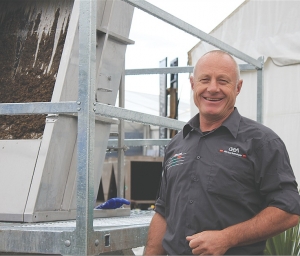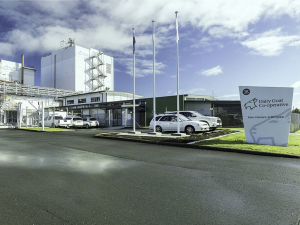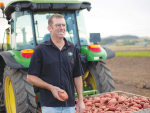Even mid-sized yards demand surprising quantities of water for each clean, perhaps not a huge concern now but likely to be soon. Hence the appeal of a yard flushing system which re-uses water from effluent ponds and sumps.
After flushing, the water from the yard is screened for effluent then put into a sump or pond. Come the next wash, the system pumps liquid from the pond, mixes it with fresh water and pumps it back out to the yard via chambers cut into the concrete surface and covered by metal plates.
Relatively common overseas, this practice has only recently been considered by farmers in New Zealand, pressured to cut fresh water consumption.
McEwan says he knows of a 1100-cow farm that cut washdown freshwater use (yard and feedpad) to 15,000L/day by using a ‘greenwash’ system pumping 120,000L of recyled water for flushing concrete.
Strict rules govern the use of greenwater on dairy yards. Fonterra forbids farmers to use hand-held hoses to green wash yards; its use is restricted to pumping it from an outlet no more than 300mm above ground, with no detectable mist or ‘aerosol’.
The holding area for greenwater must be at least 10m from milking plant if it holds up to 22,500L, or 20m if it holds more. Green water may not come closer than 5m from cups.
The yard must be washed after every milking and must be free of residual sediment; the water recovery system must have consistent delivery of water free from excessive sediment or offensive odours.
No milk produced in a shed with a greenwash system attached may be used to make unpasteurised dairy products.
McEwan says setting up systems right is essential and will make sure washdown runs smoothly.
Product from greenwash systems tends to be more valuable when spread back on a paddock because it contains more nutrients from multiple washes.
McEwan says Environment Waikato requires farmers to limit water use to 70L/cow/day under resource consents.
Tel. 0800 432 3276
www.gea-farmtechnologies.com









